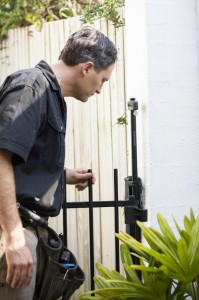BuildingPro Tip: Pool Owners can face fines if they do not meet the new Pool Safety Standards by 30 November 2015!
At BuildingPro our aim is to assist you so that all your buildings including your pool comply with the legislation under the Building Act 1975.
ALL pool owners in Queensland have a responsibility to ensure that their pools comply with the new pool safety standard by 30th November 2015 otherwise they may face on-the spot fines by Council.
The legislation can be confusing for pool owners so here is a list of the important things you need to know.
 1. Make sure that your pool is registered. All new and existing pools in Queensland must be registered with the Queensland Building and Construction Commission. You may search the register online at www.smarteda.qld.gov.au
1. Make sure that your pool is registered. All new and existing pools in Queensland must be registered with the Queensland Building and Construction Commission. You may search the register online at www.smarteda.qld.gov.au
2. To avoid on-the-spot fines, make sure that by November 30th your pool complies with the new uniform standard introduced on 1st December 2010 by the Queensland Development Code Mandatory Part 3.4 which serves to replace the 11 different standards that previously applied. This new standard focuses mainly on pool fences and safety barriers. As of November 30th 2015, all pool owners must maintain pool barriers, meet all pool fencing regulations and safety standards, and immediately repair or replace damaged fencing or barriers among other requirements. We strongly recommend that a licensed Pool Safety Inspector check your pool to ensure its compliance.
3. Get a Pool Safety Certificate if you are buying, selling or leasing a property with a pool. Pool Safety Certificates are valid for 1 year for a shared pool and 2 years for a non-shared pool regardless of how many times the property has been re-sold or re-leased during that period.
4. Know the legal requirements if you are about to enter into a contract for sale. Before entering into a contract for sale, a Seller must either:
- give the Buyer a Pool Safety Certificate known as a Form 23 or
- give the Buyer a Form 36 which advises that the pool does not comply with the pool safety standard and sets out the steps that must be taken to comply.
5. A Form 36 is intended to help prospective buyers make a more informed decision about purchasing the property. By knowing what needs to be done in order to make the pool compliant, the Buyer can better evaluate the condition of the property for sale.
6. Know the legal requirements regarding pools before Settlement Date. Before Settlement a Seller must either:
- give the Buyer a Pool Safety Certificate (Form 23) or
- ensure that the Buyer has a Form 36 and provide a copy to the QBCC.
7. Know the legal requirements regarding pools after Settlement Date. If the Buyer has not been given a valid Pool Safety Certificate (Form 23) before Settlement Date, the Buyer must obtain one within 90 days of Settlement. This 90 day period cannot be extended.
8. Know the legal requirements regarding pools for properties sold at Auctions. For properties sold at Auction, the Seller must show proof of a valid Pool Safety Certificate (Form 23) to the Buyer at auction or if there is no valid Pool Safety Certificate in place, the Auctioneer must provide a Form 36 to all prospective Buyers before they enter into a contract of sale.
9. Make sure you follow up with a re-inspection if a pool inspection determines that the pool does not comply. If you do not have a re-inspection to confirm compliance within 90 days of the initial inspection date, the Pool Safety Inspector must notify Council.
10. Ultimately this new legislation means that ALL pool owners must ensure that their pools are safe. This will result in less child drownings in private swimming pools.
For all enquiries about pool inspections or to book a Pool Safety Inspection & Pool Safety Certificate or for a Full Pool Safety, Pool Structure and Pool Equipment Inspection, call BuildingPro on (07) 3311 2273; email us at info@buildingpro.com.au or book online at www.buildingpro.com.au.












